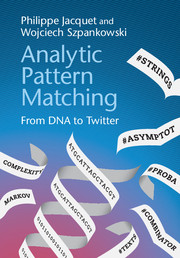Foreword
Published online by Cambridge University Press: 05 July 2015
Summary
Early computers replaced calculators and typewriters, and programmers focused on scientific computing (calculations involving numbers) and string processing (manipulating sequences of alphanumeric characters, or strings). Ironically, in modern applications, string processing is an integral part of scientific computing, as strings are an appropriate model of the natural world in a wide range of applications, notably computational biology and chemistry. Beyond scientific applications, strings are the lingua franca of modern computing, with billions of computers having immediate access to an almost unimaginable number of strings.
Decades of research have met the challenge of developing fundamental algorithms for string processing and mathematical models for strings and string processing that are suitable for scientific studies. Until now, much of this knowledge has been the province of specialists, requiring intimate familiarity with the research literature. The appearance of this new book is therefore a welcome development. It is a unique resource that provides a thorough coverage of the field and serves as a guide to the research literature. It is worthy of serious study by any scientist facing the daunting prospect of making sense of huge numbers of strings.
The development of an understanding of strings and string processing algorithms has paralleled the emergence of the field of analytic combinatorics, under the leadership of the late Philippe Flajolet, to whom this book is dedicated. Analytic combinatorics provides powerful tools that can synthesize and simplify classical derivations and new results in the analysis of strings and string processing algorithms. As disciples of Flajolet and leaders in the field nearly since its inception, Philippe Jacquet and Wojciech Szpankowski are well positioned to provide a cohesive modern treatment, and they have done a masterful job in this volume.
- Type
- Chapter
- Information
- Analytic Pattern MatchingFrom DNA to Twitter, pp. xi - xiiPublisher: Cambridge University PressPrint publication year: 2015

